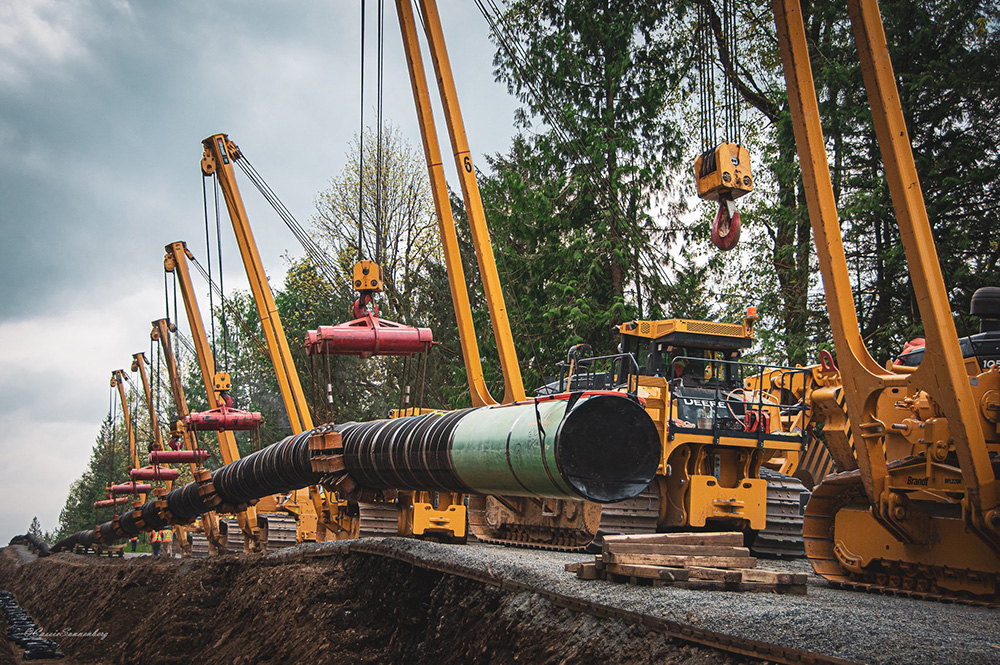Canada's five biggest banks increased their fossil fuel financing by 70 per cent, or around $61 billion, last year, according to the annual Banking on Climate Chaos report, put together by several environmental organizations.
During that same time 601 British Columbians lost their lives due to extreme weather linked to climate change, which is primarily caused by fossil fuels.
Since Canada signed the Paris Agreement in 2016, where it pledged to keep global warming below 1.5 C, Canadian banks have funnelled $911 billion into coal, gas and oil, the report said.
The report is put together by Rainforest Action Network, BankTrack, Indigenous Environmental Network, Oil Change International, Reclaim Finance, Sierra Club and urgewald.
In 2021, RBC, Scotiabank, CIBC, TD and the Bank of Montreal all increased their fossil fuel financing and provided a combined $165 billion to fossil fuel clients, the report said. At the same time, all of the banks pledged to be “net-zero" by 2050.
Over the same period, financing for Canada's tarsands increased by 51 per cent to $23.3 billion, with RBC and TD facilitating the biggest increases.
That statistic is “gut wrenching,” said Melina Laboucan-Massimo, who is the co-founder of Indigenous Climate Action and the founder of Sacred Earth Solar, which helps connect Indigenous communities with renewable energy.
Laboucan-Massimo is Lubicon Cree and grew up in the community of Little Buffalo, in the heart of the tarsands. Over her lifetime she's watched the landscape change dramatically. In the ’80s she used to drink from the rivers and breathe clean air, “but now it's oil spills, fracked gas pipeline spills, toxic air, can't drink from the water, have to get water shipped in to the community,” she said.
This report clearly shows Canada and its banks are going in the “wrong direction to address the climate crisis,” she added.
Canadian banks are not the biggest fossil fuel financiers in the world — that title is held by American banks — but RBC, Scotiabank and TD are on the top 12 list, and all five major Canadian banks are part of the top 20 financiers.
This is the 13th edition of the annual Banking on Climate Chaos report, which analyzes the funding the world's 60 largest banks provide to major fossil fuel companies and projects.
Out of the world’s 60 largest banks, here’s how Canadian financial institutions ranked:
- RBC came in at fifth with $48.4 billion in fossil fuel financing provided in 2021 and $251.2 billion since 2016;
- Scotiabank ranked ninth with $37.9 billion in 2021 and $186.4 billion since 2016;
- TD was 11th with $26.5 billion in 2021 and $175.8 billion since 2016;
- BMO was 15th with $23.5 billion in 2021 and $146.2 billion since 2016;
- CIBC was 20th with $27.7 billion in 2016 and $112.7 billion since 2016.
(These numbers were converted from U.S. dollars used in the report to Canadian dollars, based on current exchange rates of US$0.80 to C$1.)
Through these banks fossil fuel financing has hit $5.7 trillion (US$4.6 trillion) since the 2016 Paris Agreement and $903 billion (US$742 billion) in 2021 alone, the report said.
Banks are looking at immediate returns and ignoring the long-term consequences of what fossil financing means for the entire world, said Wet’suwet’en Hereditary Chief Na’Moks, of the Tsayu clan.
“We don't approve of anything that will add to the climate disaster we're all facing,” he said.
RBC gives “major” funding to the Coastal GasLink pipeline, which is being built on Wet'suwet'en territory without the consent of the Hereditary Chiefs, who have always retained authority over their traditional territories, Na'Moks said. This goes against the United Nations Declaration on the Rights of Indigenous Peoples nationally and the Declaration on the Rights of Indigenous Peoples Act provincially.
Fossil financing impacts Indigenous rights and perpetrates the ongoing genocide against First Nations peoples by destroying the environment that Indigenous people cultivated relationships with for thousands of years, Laboucan-Massimo said. “When you destroy the land you destroy the people of the land where that relationship is held,” she said.
These Indigenous rights violations are part of why Hollywood celebrities and Indigenous climate activists are teaming up and calling on RBC to divest from fossil fuels and to stop funding the Coastal GasLink pipeline in a campaign called No More Dirty Banks.
“We talk about dirty oil — this is dirty money,” Na'Moks said. “It's criminal. Indigenous and human rights get laid to the wayside for the dollar bill.”
Na'Moks said he can still drink straight from the rivers, streams and creeks on his territory. There are not a lot of places left in the world you can still do that, he added.
That loss of clean drinking water is part of the violence of climate change, which kills people, steals their futures and impacts them emotionally and spiritually, Na'Moks said.
The Tyee contacted RBC, Scotiabank, CIBC, TD and the Bank of Montreal with questions about fossil fuel and renewable energy financing and to explain the rationales behind increasing fossil fuel financing during a climate crisis.
In an email, TD spokesperson Thomas Chanzy said the bank doesn't disclose specific numbers around fossil fuels or renewable energy financing but that it recognizes the “critical business and environmental challenge of climate change,” and pointed to the bank’s 2050 net-zero goal.
BMO didn't respond to questions but directed The Tyee to its 2021 climate and sustainability reports, which restate the bank's commitment to “the goal of net zero by 2050.”
CIBC similarly directed The Tyee to its 2021 sustainability report that says it will encourage clients to transition to a low-carbon economy and reduce the carbon footprint of clients and the bank's operations.
CIBC's report did not mention divestment and BMO's report said it did not “believe” divestment “support[ed] emissions reduction in isolation.”
In an email, RBC spokesperson Rafael Ruffolo said the report “does not adequately account for how the funds are used.” Clients may, he suggested, be implementing sustainability and transition plans using some of these funds.
Ruffolo also said fossil financing numbers look like they made a big jump this year, but that's really just the market rebounding from the pandemic.
Na'Moks said he will be attending RBC's AGM on April 7 alongside two other Hereditary Chiefs to call on the bank to divest from fossil fuels and to include environmental risks in project calculations.
“They're not being open and honest with the public about what they're doing,” he said. “Their websites have lots of pages about how investing with them will make big returns, but the truth is they're killing the planet.”
“I'd love to see my grandchildren drink clean water, all they see is money,” he said. “They don't care about anything else.” ![]()
Read more: Indigenous, Rights + Justice, Environment
















Tyee Commenting Guidelines
Comments that violate guidelines risk being deleted, and violations may result in a temporary or permanent user ban. Maintain the spirit of good conversation to stay in the discussion.
*Please note The Tyee is not a forum for spreading misinformation about COVID-19, denying its existence or minimizing its risk to public health.
Do:
Do not: